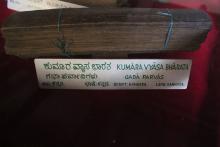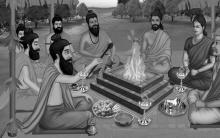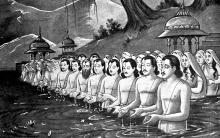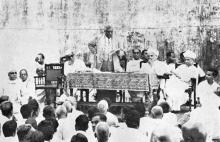Author:shashikiran
ಭೀಮ ಹುಟ್ಟಿನಿಂದಲೇ ಮಹಾಬಲಶಾಲಿ, ವಜ್ರದೇಹಿ, ಉಳಿದವರಿಗಿಂತಲೂ ಸಂಪೂರ್ಣ ಭಿನ್ನ ಎಂದು ಚಿತ್ರಿಸುತ್ತಾನೆ ಕುಮಾರವ್ಯಾಸ. ಭೀಮನ ಜನನದ ನಂತರ ಕುಂತಿ ಇಂದ್ರನನ್ನು ಜಪಿಸಿ, ಅರ್ಜುನನನ್ನು ಪಡೆಯುತ್ತಾಳೆ. “ಲೋಕತ್ರಿತ್ರಯದಲಿ ಬಲುಗೈ ಕಣಾ, ಪಶುಪತಿಗೆ, ಪುರುಷೋತ್ತಮಗೆ ಸರಿ ಮಿಗಿಲೆಂಬ…” (ಆದಿಪರ್ವ 4.60), ಸುತನನಿತ್ತೆನು ಎಂದು ಹೇಳಿ ಇಂದ್ರ ಹಿಂದಿರುಗುತ್ತಾನೆ. ಅರ್ಜುನ ಜನಿಸಿದಾಗ ದೇವದುಂದುಭಿ ಮೊಳಗಿ, ಕುಸುಮಾವಳಿಯ ಮಳೆ ಸುರಿದು ಪ್ರಕೃತಿಯಲ್ಲಿ ಶುಭ ಶಕುನಗಳಾಗುತ್ತವೆ. ಅರ್ಜುನನ ಜನನಕ್ಕೆ ಮೂರು ತಿಂಗಳ ಮುನ್ನ ಶ್ರೀ ಕೃಷ್ಣನ ಜನನವಾಗಿ ಇವರಿಬ್ಬರೂ ಸುಮಾರು ಸಮ ವಯಸ್ಕರಾಗಿರುತ್ತಾರೆ. ನಂತರ ಅಶ್ವಿನೀ ದೇವತೆಗಳಿಂದ ಮಾದ್ರಿಯಲ್ಲಿ ನಕುಲ ಸಹದೇವರು ಜನಿಸುತ್ತಾರೆ. ಈ ಮಕ್ಕಳ ಜನನದ ವಿವರಗಳು ಭಾರತದ ಕಥೆಗೆ ಪ್ರಸ್ತಾವನೆಯಾಗುತ್ತದೆ.
Organizer of Society
One of the vows of DVG’s life was to infuse dynamism in society. He made one or the other attempt in this direction for about fifty or sixty years.
ಋತ, ಸತ್ಯ, ಧರ್ಮ
ಋತ, ಸತ್ಯ, ಧರ್ಮ – ಇವು ಪರಸ್ಪರ ಸಂಬದ್ಧ ಶಬ್ದಗಳು. ಋತ ಮತ್ತು ಸತ್ಯ, ಸತ್ಯ ಮತ್ತು ಧರ್ಮ – ಈ ಶಬ್ದಯುಗಳಗಳು ವೇದಸಾಹಿತ್ಯದಲ್ಲಿ ಅನೇಕ ಕಡೆಗಳಲ್ಲಿ ಬಳಕೆಗೊಂಡಿವೆ. ನಿದರ್ಶನಕ್ಕೆ:
Śri Ḍoṅgre Vīreśvara Śāstri who hailed from Maharashtra was Lakṣmīnarasiṃha Śāstri’s classmate during one of the batches. In later years, he served in various institutions in a number of capacities: in Andhra Pradesh, as professor of Vedic exegesis; in the Sanskrit section of Deccan College in Pune, as a senior scholar; and in the Pāṭhaśālā established by Svadharma-svarājya-saṅgha in Hyderabad, as professor. Rashtriya Sanskrit Vidyapeetha based in Tirupati honoured him with the title ‘Mahāmahopādhyāya.’ He passed away on 14.08.2001.
Around 1914-1915, when Visvesvaraya was the Diwan, Hariyanna, who was a trader in the wholesale market (Mandi), was appointed by the government to the Legislative Council.
In those days, I wasn't well acquainted with Mandi Hariyanna. I had heard that he was a big businessman and a very respectable person. I had also gone to him a few times seeking donations for some public cause. Then it was imprinted in me that he was a great man.
Beauty in his Words
Even if a minor grammatical mistake in the English language fell on Sastri’s ears, he would react as though he was gravely wounded on his body. He was very particular about the right pronunciation of English words too. Suppose an English word has two to three syllables, there is going to be a stress on one of those and this is called accent. Sastri was always particular about getting the accents right.










